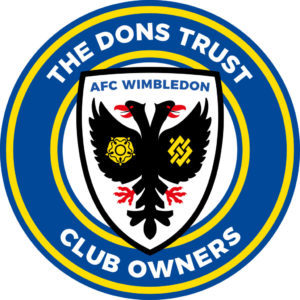Given our history, one of the Dons Trust’s long-term aims has always been to look to improve the wider ecosystem of football.
Over the last 18 months the Trust has been at the heart of a quiet revolution in the corridors of power. In February 2021, the Dons Trust helped set up Fair Game, with AFC Wimbledon as founder members. An organisation that, with the backing of the Trust Board, I’m proud to now be the CEO of.
Since then, Fair Game has grown and is now an organisation of 34 hard-working professional football clubs, including today’s opponents Doncaster Rovers.
With the support of over 40 experts, and under the watchful eye of the Dons Trust Board, Fair Game has developed long-term solutions to the problems our national game is facing and presented them to the powers that be. And partially due to those efforts we have seen notable changes.
Just last week the FA announced rule changes that will stop clubs from changing club colours, name, or badges without majority approval of their supporters – and they have also announced plans to prohibit clubs moving from the area where they take their name without the backing of their fans.
The EFL will this season rate every club on how they perform on equality, diversity, and inclusion. And provide support on how clubs can improve.
New environmental measures are also coming into place and a more robust Owners and Directors Test is also being promised.
The last big challenge is to address football’s financial flow.
We operate in a world where the only way to succeed on the pitch is to gamble – and at stake is a club’s very existence.
In the Championship, a vast majority of clubs spent more on players’ wages than they earnt. It is a culture that spills down the pyramid and it is no surprise that in 2020, that’s before the pandemic, 61% of clubs in the EFL were technically insolvent.
Yet little support is given. Of the £600m the Premier League gives to the EFL each year, only 1.6% of it goes to League Two. Indeed, one relegated club from the Premier League gets more (£45m) than all of the clubs of League One and League Two put together.
It is an unfair and unsustainable model.
Firstly, the weighting should be based on divisional average attendance, not on being a failed Premier League club.
But most importantly, we need a system where well-run clubs are rewarded – clubs that are financial sustainable, those that spend less than they earn.
For the change to happen we need an independent regulator that has control over financial flow in the game. And with a White Paper on football governance due to be published next month. The Paper will be followed by a period of consultation and for that reason Fair Game’s advocacy work has gone into overdrive.
Fair Game has met with ministers, played a huge role in the recent Fan-Led Review, and has fed into numerous government papers. We will be present at the Labour and Liberal Democrat Party Conferences and the Tory MP for Wimbledon Stephen Hammond will be here as a guest on 1 October.
We have never been closer to a new and better future for football.
You can make a difference, please write to your local MP and local councillors, and ask them to back Fair Game. To find out more visit www.fairgameuk.org.


